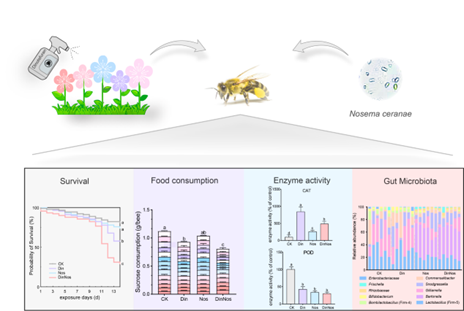Study reveals interacting effects of dinotefuran and Nosema ceranae on honeybee survival and gut microbial community
Date:2024-06-12
A recent study by the State Key Laboratory of Resource Insects of the Institute of Apicultural Research of the Chinese Academy of Agricultural Sciences has revealed that the interaction of dinotefuran and N.ceranae can have a detrimental impact on bee survival and intestinal microbial community composition. The research findings were published in Pesticide Biochemistry and Physiology.
Numerous studies have demonstrated that the cause of colony collapse disorder may be attributed to combination of stressors, with pesticides and parasites representing the two primary stressors. The objective of this study was to examine the impact of the N. ceranae on the health of honeybees exposed to a sublethal dose of the pesticide dinotefuran. The study findings revealed that the combined action of dinotefuran and N. ceranae exhibited a synergistic effect on bee survival. Concurrently, bees co-exposed to N. ceranae exhibited reduced food intake and greater changes in antioxidant enzyme activity compared to bees exposed to dinotefuran alone. Furthermore, the combined exposure of N. ceranae and Dinotefuran significantly affected the gut microbial community structure and richness of bees, while the exposure of dinotefuran alone did not significantly affect the core gut microbial community of bees. Long-term exposure to dinotefuran has been shown to reduce bee survival, yet does not necessarily lead todisorderof the gut microbiome. Instead, the parasite N. ceranae plays a leading role in the combination of the two. The study provides important insights into the function of the bee gut microbiome and the combined effects of abiotic and biological stressors on bees.
This work was supported by the National Natural Science Foundation of China, Central Public-interest Scientific Institution Basal Research Fund, and Agricultural Science and Technology Innovation Program.
Link: https://doi.org/10.1016/j.pestbp.2024.105808 (Correspondence: Yan-yan Wu)
